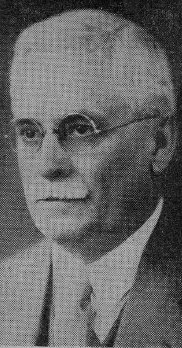Bion J. Arnold: Difference between revisions
No edit summary |
No edit summary |
||
| Line 1: | Line 1: | ||
== Bion Arnold: Biography == | == Bion Arnold: Biography == | ||
[[Image:Arnold picture.jpg|thumb|left]] | [[Image:Arnold picture.jpg|thumb|left]] | ||
Born: 14 April 1861<br>Died: 29 January 1930 | Born: 14 April 1861<br>Died: 29 January 1930 | ||
Bion Arnold was born on 14 April 1861 near Grand Rapids, Michigan. He graduated from Hillsdale College in 1884 and then pursued graduate work at Cornell University and the University of Nebraska. | |||
Arnold spent his life on projects that eased urban living. After he graduated from college, he formed a company that would help the nation’s railways convert from team to electric power. In 1893 he built the Chicago World fair’s intramural railroad, which marked the first commercial use of a third rail. From 1902 to 1907 he was Chicago’s consulting engineer and was thus responsible for overseeing the construction of their street railways. Afterward, he worked on the city’s subway efforts. Arnold’s expertise was much in demand; he also worked on transportation systems for San Francisco, Pittsburgh, Toronto and Providence. One of his most ambitious projects involved the electrification of New York’s Grand Central Station, a task that Arnold worked on for five years and which cost 60 million dollars. In addition to his critical work on railways, he invented a magnetic clutch and improved storage batteries. During World War I , he served in the Army Signal Corps and during that time studied aircraft and torpedo production. | |||
Arnold was [[Presidents of the American Institute of Electrical Engineers (AIEE)|president of the AIEE]] in 1903 and 1904. He was also a member of the AAAS, former president of the Western Society for Engineers and active member of several veterans associations.<br> | |||
'''Would you like to help us? Use the edit tab to contribute to this article. '''<br> | |||
See also: [[Papers of Bion J. Arnold|Papers of Bion J. Arnold]] | |||
[[Papers of Bion J. Arnold|Papers of Bion J. Arnold]] | |||
[[Category:People_and_organizations]] [[Category:Engineers]] | [[Category:People_and_organizations]] [[Category:Engineers]] | ||
Revision as of 18:01, 3 September 2009
Bion Arnold: Biography
Born: 14 April 1861
Died: 29 January 1930
Bion Arnold was born on 14 April 1861 near Grand Rapids, Michigan. He graduated from Hillsdale College in 1884 and then pursued graduate work at Cornell University and the University of Nebraska.
Arnold spent his life on projects that eased urban living. After he graduated from college, he formed a company that would help the nation’s railways convert from team to electric power. In 1893 he built the Chicago World fair’s intramural railroad, which marked the first commercial use of a third rail. From 1902 to 1907 he was Chicago’s consulting engineer and was thus responsible for overseeing the construction of their street railways. Afterward, he worked on the city’s subway efforts. Arnold’s expertise was much in demand; he also worked on transportation systems for San Francisco, Pittsburgh, Toronto and Providence. One of his most ambitious projects involved the electrification of New York’s Grand Central Station, a task that Arnold worked on for five years and which cost 60 million dollars. In addition to his critical work on railways, he invented a magnetic clutch and improved storage batteries. During World War I , he served in the Army Signal Corps and during that time studied aircraft and torpedo production.
Arnold was president of the AIEE in 1903 and 1904. He was also a member of the AAAS, former president of the Western Society for Engineers and active member of several veterans associations.
Would you like to help us? Use the edit tab to contribute to this article.
See also: Papers of Bion J. Arnold
